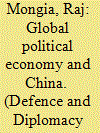| Srl | Item |
| 1 |
ID:
130566


|
|
|
| 2 |
ID:
089773


|
|
|
|
|
| Publication |
2009.
|
| Summary/Abstract |
This article looks at currently bestselling biographies in urban China as popular histories of the national self from 1949 to the present. In their retrospective narrations of the Cultural Revolution and economic reform, they identify a reorientation of life away from ideological community and towards market rationality. I locate this shift also in the history of the publishing industry that produces them and analyse how publishing practices and values have changed from Mao to Jiang, to argue that a reconstitution of the "good" has been effected by the deployment of old rhetorical goals under structurally new conditions. Extended into the broader political arena, this suggests that institutional continuity in contemporary China masks a reconstitution of governance itself, from direct intervention and political control to administrative regulation and commercial competitiveness. Communist revolutionary ambitions are now redefined and fulfilled through economic success in commercial enterprise. Contrary to the prevalent notion that such couplings are contradictory and unsustainable, I argue that a mutually generative relationship currently exists between the two.
|
|
|
|
|
|
|
|
|
|
|
|
|
|
|
|
| 3 |
ID:
187938


|
|
|
|
|
| Summary/Abstract |
Since 2013 China has established new Pilot Free Trade Zones (PFTZs) across the country to encourage experimentation in economic reform. The objective of the PFTZ policy is twofold: they serve as experimentation grounds for "policy innovation" and further economic development by gradually diffusing reform implementation beyond the PFTZs, and those PFTZs located at border areas promote economic regionalization beyond the Chinese mainland's territory, tying in the "Belt-and-Road Initiative" (BRI). Based on recent fieldwork in the Fujian PFTZ and its three localities, Fuzhou, Xiamen and Pingtan island, this article contributes to our understanding of economic reform and policy experimentation in the era of "top-level design" under Xi Jinping. The authors argue that PFTZ policy achievements have been mostly procedural rather than tackling the core issues of trade, service and financial reform. Moreover, the recentralized policy process has led to dysfunctional results regarding the PFTZ's reform agenda. We also shed light on changing patterns of Taiwanese investment in Fujian in times of frozen cross-strait relations.
|
|
|
|
|
|
|
|
|
|
|
|
|
|
|
|
| 4 |
ID:
170978


|
|
|
|
|
| Summary/Abstract |
Since China's economic reform began in 1978, millions of migrant workers have moved from inland provinces to coastal cities in search of work. This had led to an abundance of cheap labor and a prevalence of despotic management styles in the private sector since the 1980s. This scenario changed significantly from the 2000s with the proliferation of workers' strikes and the efforts of the party-state to regulate workplace relations. Against this backdrop, scholars have debated about the extent to which labor relations in China have changed, and where they may be heading. As a contribution to this debate, this special issue brings together six articles with strong empirical evidence to unpack the complexity and dynamics of workers' struggles and organizations in South China in the context of a changing political economy. Going beyond the polarization of an optimistic vision on labor movements, and a pessimistic view that emphasizes state power, we pay equal attention to the power of state institutions and workers' agency in shaping labor relations during the past four decades.
|
|
|
|
|
|
|
|
|
|
|
|
|
|
|
|